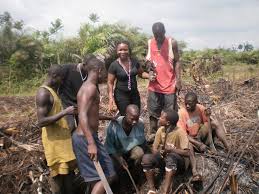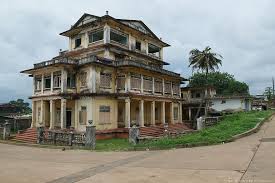According to " The Point.fr "
In the shade of palm trees lining a market Monrovia, street vendors attract customers screaming. But they always keep an eye on the police , accusing them of racketeering .
Sitting in her jewelry Waterside Market , big market beachfront , Zoe Freman , 29, has an anxious smile when she tells how police routinely confiscate their goods and extort money from him .
"Sometimes they make you pay 500 Liberian dollars (4.2 euros) or 10 U.S. dollars ( 7.3 euros) , again U.S. $ 20 (14.6 euros) . Amounts vary agents. When they confiscate your merchandise, the time to recover to the police , they stole almost everything , " she says .
Under high heat , stirring air mingling scents of smoked fish and ripe mangoes , traders tell their misadventures with the police in Monrovia, capital of a country among the poorest in the world.
Liberia was ravaged by civil wars from 1989 to 2003 : the 14 years of conflict have some 250,000 deaths, forced thousands of residents to flee and ruined the economy.
More than ten years later, Monrovia still lacks a good grid and water supply . Unemployment and illiteracy are endemic.
Dayougar Abel , 26, said he had converted into a vendor tat, after the robbery took him to jail. But because of " harassment " of the police, he begins to wonder if he made the right choice. And he calls President Ellen Johnson Sirleaf.
" I came into this market to earn honest living . I beg the President to speak to his police to leave us quiet ," he says .
On the road from Mechlin Waterside Market, align sewing workshops , stores and Indian clothing Lebanese dishes. Here, too, complains of police harassment choir .
- The most corrupt institution -
Luis Gray , dealer 33 years , says he was beaten one day after opposing an officer who wanted to confiscate his goods.
International NGOs warn elsewhere on this problem for this country considered one of the most corrupt in the world.
Liberians interviewed twenty percent in the 2013 report of the advocacy organization Human Rights Human Rights Watch ( HRW) said they had been victims of police racketeers .
In a report published the same year , Transparency International presented the police as the most corrupt institution in the country and 77% of respondents said Liberians have been ransomed in 2012.
But Chris Massaquoi , the head of the Liberian police , the institution is not the only body affected by corruption in the country. And it puts the population to its own responsibilities.
" How can a police officer is corrupt It is through citizens , motorists ... If they do not give money , there will be no corruption ," he argues .
Several officers guilty of corruption, were , according to him, suspended or delisted . " It's over the time police brutalizing the population without consequence. We ensure the application of the law so that everyone is protected ," he says .
In police generally ruined , police say they lack electricity, water, but also vehicles, computers, communication , uniforms ... and even handcuffs. The monthly salary of a police officer, 150 U.S. dollars, is considered low compared to the thousand worries of everyday life.
" The agents want to work but the main difficulty is the lack of means," insists a police official .
Liberia has 4,864 police officers for a population of 4.3 million. Scotland , with a comparable population, four times more .
Security is assured since 2003 by the United Nations Mission in Liberia ( UNMIL ) , whose numbers , having peaked at 15,000 in 3800 will drop this summer , leaving this task to the single national police.
Amara Kamar , another part of the police, and said to have only 45 elements for its section while her double takes .
To fill this gap , recruitment is underway. The police chief hopes his troops count total 8,000 agents by 2017.
"This is a country torn by 14 years of civil war ," he says. "Everything is a priority here."




In the shade of palm trees lining a market Monrovia, street vendors attract customers screaming. But they always keep an eye on the police , accusing them of racketeering .
Sitting in her jewelry Waterside Market , big market beachfront , Zoe Freman , 29, has an anxious smile when she tells how police routinely confiscate their goods and extort money from him .
"Sometimes they make you pay 500 Liberian dollars (4.2 euros) or 10 U.S. dollars ( 7.3 euros) , again U.S. $ 20 (14.6 euros) . Amounts vary agents. When they confiscate your merchandise, the time to recover to the police , they stole almost everything , " she says .
Under high heat , stirring air mingling scents of smoked fish and ripe mangoes , traders tell their misadventures with the police in Monrovia, capital of a country among the poorest in the world.
Liberia was ravaged by civil wars from 1989 to 2003 : the 14 years of conflict have some 250,000 deaths, forced thousands of residents to flee and ruined the economy.
More than ten years later, Monrovia still lacks a good grid and water supply . Unemployment and illiteracy are endemic.
Dayougar Abel , 26, said he had converted into a vendor tat, after the robbery took him to jail. But because of " harassment " of the police, he begins to wonder if he made the right choice. And he calls President Ellen Johnson Sirleaf.
" I came into this market to earn honest living . I beg the President to speak to his police to leave us quiet ," he says .
On the road from Mechlin Waterside Market, align sewing workshops , stores and Indian clothing Lebanese dishes. Here, too, complains of police harassment choir .
- The most corrupt institution -
Luis Gray , dealer 33 years , says he was beaten one day after opposing an officer who wanted to confiscate his goods.
International NGOs warn elsewhere on this problem for this country considered one of the most corrupt in the world.
Liberians interviewed twenty percent in the 2013 report of the advocacy organization Human Rights Human Rights Watch ( HRW) said they had been victims of police racketeers .
In a report published the same year , Transparency International presented the police as the most corrupt institution in the country and 77% of respondents said Liberians have been ransomed in 2012.
But Chris Massaquoi , the head of the Liberian police , the institution is not the only body affected by corruption in the country. And it puts the population to its own responsibilities.
" How can a police officer is corrupt It is through citizens , motorists ... If they do not give money , there will be no corruption ," he argues .
Several officers guilty of corruption, were , according to him, suspended or delisted . " It's over the time police brutalizing the population without consequence. We ensure the application of the law so that everyone is protected ," he says .
In police generally ruined , police say they lack electricity, water, but also vehicles, computers, communication , uniforms ... and even handcuffs. The monthly salary of a police officer, 150 U.S. dollars, is considered low compared to the thousand worries of everyday life.
" The agents want to work but the main difficulty is the lack of means," insists a police official .
Liberia has 4,864 police officers for a population of 4.3 million. Scotland , with a comparable population, four times more .
Security is assured since 2003 by the United Nations Mission in Liberia ( UNMIL ) , whose numbers , having peaked at 15,000 in 3800 will drop this summer , leaving this task to the single national police.
Amara Kamar , another part of the police, and said to have only 45 elements for its section while her double takes .
To fill this gap , recruitment is underway. The police chief hopes his troops count total 8,000 agents by 2017.
"This is a country torn by 14 years of civil war ," he says. "Everything is a priority here."
Nessun commento:
Posta un commento